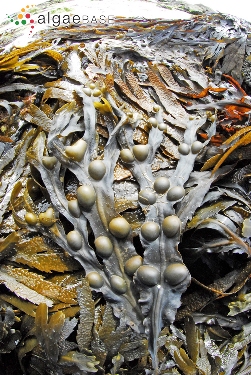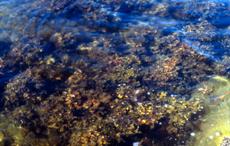
Welcome to the world of Fucus vesiculosus AKA Bladderwrack!
 Who cares about a brown algae?
Who cares about a brown algae?
The brown alga Fucus vesiculosus is one of the most
prevalent species of algae in the north Atlantic Ocean. The
species provides food to a lot of organisms that live near the
shore in the northern Atlantic, and it is almost certain that
megafauna such as Britain's harbor seal would not be around if
it were not for this primary producer. Fucus vesiculosus
also provides multiple compounds that are useful to humans, from
helping people lose weight, to curing a goiter caused by iodine
deficiency. You can learn more about thes by going to the
implications
page. You
can also learn more about literally thousands of algae by
going to
algaebase.org.
Bladder what?
Fucus vesiculosus gets its common name, bladderwrack, from
the air bladders that are present in pairs on the blade of a
plant-like
structure called a thallus. The picture to the left shows this
feature very well. Why is bladderwrack so brown, and not the
green that most people associate algae with? Well, you can learn about
this by visiting the
adaptation page.
What does this thing eat?
Bladderwrack is not a plant, so how does this
food get its nutrients? It goes through the exact same process
that plants do. To understand this process, and how F.
vesiculosus gets the rest of its nutrients, check out the
nutrition page.
Once you have finished searching through all the information that is presented on this site, you can find more information on very diverse organisms by visiting multipleorganisms.net, a site created by Dr. Thomas Volk and many of his students. This site provides information on hundreds of organisms from the Bluegill Fish to the Mandarin Orange.
The Author
My name is Ben Harris and I created this website for my
Organismal Biology class at the
University of Wisconsin - La Crosse
and last updated it on April 13, 2011. You can learn more about
me by going to the
About the Author page.
A special thanks
I would just like to give a special thanks to Ester
Serrão of the University of Algarve in
Portugal. She was instrumental in the creation of this website,
and if you look at my
references page, you will see that I used
quite a bit of her research. She also gave me numerous pictures
of F. vesiculosus that you can find throughout the
site. You can learn more about Dr. Serrão's research by visiting
her website
here.
Start out by going to the Classification page